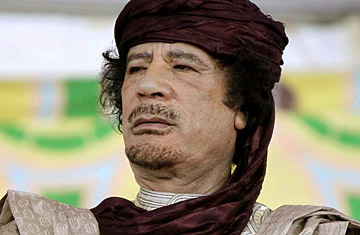
Libyan leader Muammar Gaddafi in 2009
Thousands of Libyans poured on to the streets of the capital on Thursday, ecstatic at the news that Muammar Gaddafi had been killed in his birthplace of Sirt. As depicted in several cellphone video images, it was a violent and gruesome death for a man who had ruled this country with an iron fist for 42 years.
After an hour and a half of unconfirmed reports, the news came on at about 3.30 p.m. that Gaddafi was indeed dead. Footage on Al Jazeera Television, showed a bloodied Gaddafi being dragged by his arms on the street toward a vehicle. Images also showed Gaddafi's body, apparently killed in gunfire, his eyes rolled back lifeless. In the lobby of the Radisson Blu Hotel, where many rebel officials, as well as foreign journalists, have been based for weeks, many Libyans doubled over, weeping, overcome with emotion. Several dressed in combat fatigues threw their arms around each other, speechless. On the street, open pick-up trucks, with young fighters atop them waving the red, green and black tricolor of the revolution, sped along the seafront, honking horns. "This is a man who's been on my mind for 40 years, and now he is not," Ali Tarhouni, the Finance and Oil Minister of Libya's National Transitional Council, or NTC, who until February was an economics professor at the University of Washington in Seattle, told reporters. "I don't know what type of emotions I have. It will require a lot of time to absorb this."
Tens of thousands of Libyans filled Tripoli's giant open space, named Green Square during Gaddafi's rule, after his socialist revolution, and now called Martyrs Square. Late afternoon, the NTC's Prime Minister Mahmoud Jibril told reporters that forensic experts were examining Gaddafi's body in a morgue in Misratah, the major city closest to Sirt, and that officials would share the details of how Gaddafi was killed, perhaps as soon as Friday. He discounted earlier reports that Gaddafi might have died in a NATO air strike earlier in the day. Tarhouni said Gaddafi had been killed by fighters from Misratah, which had rebelled against the colonel and withstood weeks and weeks of a punishing siege by Gaddafi's forces.
With Gaddafi now dead, the NTC will likely disband, yielding power to a temporary government, perhaps Friday. Jibril said the council would then declare a formal end to the eight-month war. That will allow officials to begin the task of rebuilding the country — and of piecing together a cohesive national military, disarming the disparate militias and brigades. Most urgent is resuming oil contracts — which provide Libya with about 98% of its revenues — and appealing to foreign investors to help, since business has effectively been frozen since the revolt erupted in mid-February. "All the evils, plus Gaddafi, have vanished," Jibril told reporters. "This is the time to start a new country, with a new economy."
For Libyans, Thursday was an astonishing moment — a time when their country has truly moved into the future. The great majority of Libyans have no memory of a time before Gaddafi's bloodless coup in 1969. Gaddafi's violent demise marked the end of a long tyranny, in which most people had been too afraid ever to speak their minds.
By sunset, there was still no word of where Gaddafi's powerful son Saif al-Islam was; though there were reports that another son Mutassim had also been killed in the assault that took the dictator's life. Jibril told reporters that a fierce gunbattle was underway involving an armed convoy which had left Sirt. He could not confirm that Saif al-Islam was in it.
One question officials will need to answer within the next few days is whether Gaddafi might have been captured alive to be able to stand trial in the International Criminal Court, in The Hague, which indicted him and Saif al-Islam for crimes against humanity, for allegedly ordering the killing of unarmed protesters in eastern Libya in February.
In footage shown Thursday evening, it appeared that Gaddafi might have been shot while his convoy was trying to flee the battle in Sirt. That would contradict the words of Abdel Hakim Bilhad, head of the military council of Tripoli, who told reporters that "Gaddafi was captured after he was killed." The television pictures showed fighters surrounding Gaddafi, bloodied but alive.
According to some accounts, Gaddafi's final moments include voices saying, "No, we want him alive." However, in scenes reminiscent of the death of the Italian strongman Benito Mussolini, street justice — not some judge in a faraway court — appeared to settle Gaddafi's fate.
